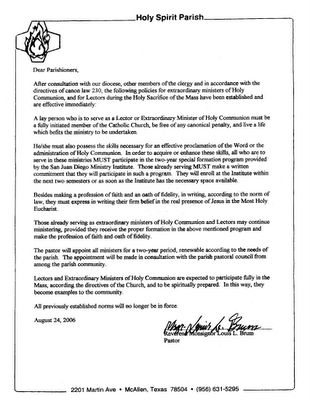
Somos el Cuerpo de Cristo
Thoughts from Some Fellow Parishioners of Holy Spirit—August 6, 2006Notes on Religious EducationElfida Martinez, Director of Youth Ministry and the person primarily responsible for middle and high school religious education at Holy Spirit has resigned. Her resignation came after the Pastor had ignored her written request to meet with him to discuss her responsibilities and the direction of religious education in the Parish.
What many people consider the most important ministry of the Parish is going to suffer from Elfida’s departure, but what everyone should understand is that this most important ministry has been suffering ever since the Monsignor has been in the Parish. For reasons that have never been expressed, he has decided to undermine the religious education staff at every turn. Micro-
mismanagement best describes what has been going on: scheduling snafus, missed deadlines, an unwillingness to deal with professional staff professionally, failure to keep those ostensibly in charge informed of events and decisions, etc. It’s a mess and Elfida’s decision to step away from an impossible work situation is very understandable.
It is difficult not to think that the Monsignor’s handling of Elfida’s situation is simply another stage in his calculated war on the Parish, its programs and its professional staff. Prevented by the courts from firing people without cause, he makes their work environment so intolerable that they quit. The fact that this approach leaves exemplary programs in a shambles and leaves the Parish dramatically diminished is completely irrelevant to him—he must, at all costs, win his self-initiated war.
Presbyterian ThoughtsFood for thought, some views on church and disagreements from two Presbyterian Seminary presidents, as presented in
God’s Politics, by Jim Wallis.
From Richard Mouw: “I do sense, however, a strong need to keep talking. The church is not some mere voluntary arrangement that we can abandon just because we do not happen to like some of the other people in the group. God calls us to the church, and that means God requires that we hang in there with each other, even if that goes against our natural inclinations.”
From Barbara Wheeler: “How’s this for a model of church that we are called to become: “They confessed that they were strangers and foreigners on earth.” What if instead of denying our estrangement, or bemoaning it, we embraced it as a gift from God?
A church that contains members we think strange, even barbaric, is a healthier setting for us, for our formation as Christians. We like to think that a church of our kind, one that excludes those who believe incorrectly and behave badly by our lights, would be a better school for goodness than the mixed church we’ve got. It is not necessarily so. Familiarity and affinity breed bad habits as well as virtues.
The last and most critical reason for all of us Presbyterian strangers to struggle through our disagreements is to show the world that there are alternatives to killing each other over differences. As long as we continue to club other Presbyterians into submission … we have no word for a world full of murderous divisions, most of them cloaked in religion.” s
ubmitted by fellow parishioner, Michelle PeñaPrivileges and RightsIn a letter to Call to Action-Rio Grande Valley (CTA-RGV), Bishop Raymundo Peña repeats an oft-cited statement “[T]he exercise of liturgical ministries (lector and extraordinary minister [of] Holy Communion) is
a privilege, not a right [emphasis added].” In a very narrow, technical sense, this is correct, but given the way most people tend to interpret and use the words
privilege and
right the Bishop’s statement is extremely misleading.
Privilege carries the connotation of something granted or withheld by authority at its whim, and
right carries the connotation of something we are reasonably entitled to if we follow acceptable standards of performance. Neither of these is correct in the narrow sense that the Bishop is using the words.
An example might help. Most of us would think that as citizens and taxpayers of the State of Texas we, and our children, have the right to enroll at a state university. This is not correct. Unlike admission to public education (K-12), which is a right granted to all by the state constitution, admission to a state university is a privilege granted to those who meet requirements. What is important to understand is that the requirements cannot be capricious, but must be based on objective criteria that are related to nature of the university. No one could be excluded from entrance to Texas A&M, for example, because they were partial to wearing orange t-shirts with “Hook ‘em Horns” emblazoned on the front. They could be excluded, however, if their academic preparation made them, in the judgment of the university, unlikely to succeed. Privileges are granted to those who meet requirements, but the requirements must be reasonable and objective. In contrast, rights are not granted; they are unqualified and they exist for everyone.
Of course, being a liturgical minister (or participating in any particular parish ministry, for that matter) could not possibly be a
right, in the narrow, technical sense. Someone with a speech defect has no absolute right to be a lector; someone with crippled hands has no absolute right to be a Eucharistic Minister; someone with little aptitude for working with children has no absolute right to teach in a religious education program, etc. So, in this narrow sense, participation in any particular parish ministry is a privilege granted to those who meet requirements—reasonable, objective requirements that are not capricious but are related to the nature of the ministry within the parish. A lector proclaims the Scripture to the community. In that role, the lector does not represent the Pastor, does not exercise authority or leadership in the community, but instead is doing nothing other than serving the community in its Eucharistic celebration. The same analysis applies to Eucharistic Minister, or any other parish ministry.
The
privilege-right distinction is, as a practical matter, a meaningless distinction, and when it is used to justify caprice and vindictiveness, it becomes a tool in creating a perversion of the meaning of a parish community.
$$$$$ UpdateAccording to the Sunday bulletins, since 10/16/05 parishioners have donated $63,785.58 less than the $609,000 the parish budget has called for (this includes an estimate for the weekend of April 2, since no data was ever reported for that date). If the spending patterns of the last fiscal year have continued (13.4% over budget), then this gives a total of $145,360.50 of red ink (versus budget) for the period 10/16/05 to 7/16/06. Stretching that pattern for an entire year, the Parish would fall short by $179,970.15.
PeaceJoin the Parish community at Wednesday night prayer (9:00 pm)—praying for an end to war, particularly the Israeli-Hezbollah conflict and the American war in Iraq.
Prepared by RGV Parishioners for Progress and edited by Jerry Brazier. Copy this, and pass it on to fellow parishioners, either by e-mail or paper. If you want an opportunity for prayerful discussion of these and other issues about the parish or have any other comments, please contact us at mailto:gbrazier@rgv.rr.comPosting a Comment: You may now submit a comment simply by clicking "POST A COMMENT" under the "COMMENTS" link below. Approval of comments are done only to prevent any objectionable or advertising type posts. You may also e-mail this article to a friend, by clicking on the envelope icon below.












